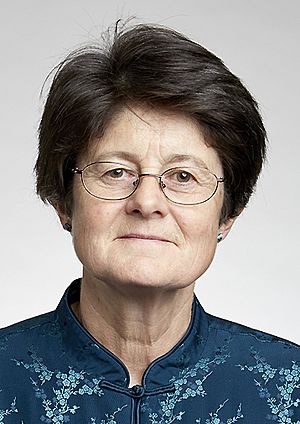Josephine Pemberton facts for kids
Quick facts for kids
Josephine Pemberton
|
|
|---|---|

Pemberton in 2017
|
|
| Alma mater |
|
| Awards |
|
| Scientific career | |
| Fields |
|
| Institutions | |
| Thesis | An investigation into the population genetics of British fallow deer (Dama dama L.) (1983) |
| Doctoral advisor | Robert H. Smith |
| Other academic advisors | Sam Berry |
Josephine M. Pemberton is a British scientist who studies how living things change over time. This field is called evolutionary biology. She is a top professor at the University of Edinburgh.
Professor Pemberton studies animals in their natural homes. She looks at how families are related and how traits like disease resistance are passed down. She has spent a lot of time studying soay sheep on St Kilda and red deer on the island of Rùm.
Her Early Studies
Josephine Pemberton went to the University of Oxford to study Zoology. Zoology is the scientific study of animals.
Later, she earned her PhD degree in 1983 from the University of Reading. For her PhD, she studied the genes of fallow deer. This helped her understand how deer populations change over time.
What She Studies
After finishing her PhD, Professor Pemberton worked as a researcher at other universities. These included University College London and the University of Cambridge.
In 1994, she became a lecturer at the University of Edinburgh. She has worked there ever since. Her research helps us understand how animals adapt and survive in the wild.
Animal Research Projects
Professor Pemberton's work often involves long-term studies of animal groups. She looks at how different traits are inherited. She also studies how animals resist parasites.
Her research helps scientists understand how animal populations stay healthy. It also shows how they change over many generations.
Amazing Achievements
Professor Pemberton has received many important awards for her work.
- In 2011, she won the Molecular Ecology Prize.
- She became an EMBO Member in 2014. EMBO is an organization for leading life scientists.
- In 2017, she was chosen as a Fellow of the Royal Society (FRS). This is a very high honor for scientists in the UK.
- She received the Darwin-Wallace Medal in 2018. This medal is given for major advances in evolutionary biology.
In 2020, she was named Chair of Natural History at the University of Edinburgh. This means she leads the study of nature there.
 | Dorothy Vaughan |
 | Charles Henry Turner |
 | Hildrus Poindexter |
 | Henry Cecil McBay |

